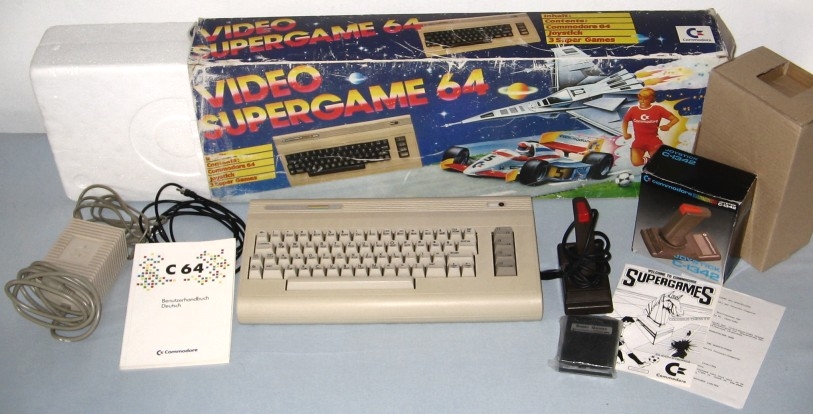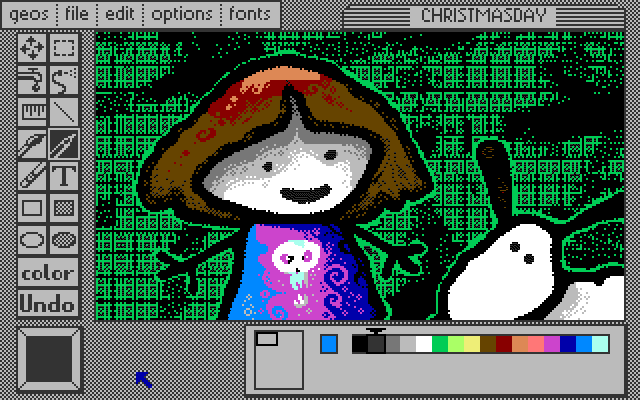Agreed. Especially on the being cheap/affordable part. It's being mentioned very often on the net and in old magazines (just recently noticed that in an article about ham radio fair in '89, btw).
Commodore was very successful at being cheap financially competitive, not much unlike McDonalds was/is (makes me wonder why they never teamed up).
Their business strategy seems to have had triggered human basic emotions on a large scale, which is interesting from a sociological point of view.
- Not that there weren't other qualities. Kids for example, care little about price. They value things in other ways; maybe smarter ways, even. And the C64 surely was better than the equally popular Atari VCS ever was.
People seem to feel satisfied if they have an advantage over someone, if they saved money on something or outsmarted someone. A friend of our family, Heinz, is just like that.
This is a concept I never really understood, still don't understand. Emotionally, I mean. But I also don't get drunk (get a headache instead) or feel jealousy or malicious joy, so.. Hm. I'm weird. 🤷
To me (poor), money always just has been an item for exchange. A momentarily possession. Nothing that lasts or can be saved (hi inflation!). It comes and goes, like the tides.
To others, some of my relatives included, it seems to be the centre of their life. They want to be the richest at the graveyard, it seems.
Personally, I never understood this concept, as much as I tried to. But according to science, it's related to the way the rewarding centre of the brain works.
Proper stimulation releases Dopamine, which makes the people feel happy. For a short moment, at least. Interesting.
Getting "high" by getting views and "Likes" (social media) causes same phenomenon.
Personally, I merely felt that way for a compliment if having done something right.
But yeah, for many money seems to be a very part of everything, as much as it saddens me to accept (still hoping for a better future). 🙁
To give an example, in my personal environment, I still hear stories of people who tell me that they paid a hefty sum for something long long ago.
Also about their first computers or cars, when they had to pay the initial price, rather than the later discount price.
They repeat it over and over - for years, always with a teary eye and a slightly psychotic facial expression.
This way of thinking/feeling deeply saddens me, because I feel they miss out on life that way. Lost money is just lost money.
A missed opportunity or the loss of a beloved pet, friend or relative is something I'd rather cry about.
Personally, if I was them, I think I would feel different. I think I wouldn't mind the lost money so much, but rather be glad I was capable to spend it in first place.
Looking back, I'd be glad to have been allowed to be alive back then, to be a part of the early user community of the day, being an "early adopter" so to say.
Being a witness of the pioneering days of computing. It would be making me feel proud, kind of. That's something priceless that money can't buy.
Edit: Now that I think of it, butjer1010 did sum it up pretty well. It's about the positive memories. 😄 👍
I mean, if something I need/want is out of reach, financially, I'd just save up money and wait a bit longer (say, a few months).
That's why my PC project take so long, also, suppose. But on the bright side, waiting may increase the anticipation. 😀
Which makes it even more special, maybe. Like watching a VHS with friends on the weekends used to be a special event to many people.
But if time is due, an installment payment is a possibility, too. Like if the washing machine or refrigerator fails and must be replaced soon.
All in all, I think, the only emotional bond I have to money is the feel of safety/security it may provide.
Having a bit of money in reserve, for emergency purpose, provides a bit of emotional support.
Being able to say, pay the vet or to buy a medication at the pharmacy.
That being said, that's just me, of course. Each to his own.
_
Anyway, back on topic of computing. I've always wondered why we (at home) haven't really noticed the C64 throughout all the years before.
But other systems, like the Ti99, Apple II, ZX81, Atari 400/800, IBM PCs and so on.
I wondered if it was because we had been focusing on productivity software, being early computer users or being just weird. 🤷
To my joy, I think I've finally found an (partial) explanation (at least) as to why we (at home) haven't heard of the C64 so much (as I wrote a few pages earlier).
Just recently, while searching the web for the rare "Quick Disk" add-on, I stumbled over an interesting computer site, which covers the market situation of the day..
In parts, I think, it could be because we were early adopters of Sharp computer line from before the C64 was cheap/omnipresent, before it had developed such an ecosystem.
But it wasn't exactly the price difference, maybe, since we (actually, my father) didn't ever own the cheap basic model but one of the higher end ones (plotter+tape drive, MZ-731).
Judging by the market situation mentioned below, I think it rather was because of the installed user base and quality (keyboard, PSU etc).
I mean, the earlier model the MZ-700 series was compatible to, the MZ-80K, was around since the late 1970s.
So there already had been expansion hardware, user clubs, magazines, etc.
So maybe, in Germany, for a while, the Sharp series was a bit like a C64 before the C64, so to say. In terms of popularity. I find this thought to be amusing. 😁
The fact that it could boot CP/M also surely helped to gain ground (third-party floppy controller need).
- After all, that's what the Commodore 128 made stand out (to us) - even it was very late to the party.
Edit: What's also interesting here, maybe a bit ironic, too: Both the Commodore and Sharp MZ datasettes are technically related.
Both use 1200 Baud and the standard FSK tones (1200/2200Hz ?). There's even a modification to read MZ tapes on PC using the ViC-20/C64 datasette drive.
Similarly, the internal MZ Plotter unit was used on other platforms, as well. It must have been some sort of standard component, I guess.
"In terms of performance, the MZ-700 series was no miracle right from the start.
Even though the overall design, the modular concept and the quality of the components are clearly better than the COMMODORE C64 introduced at the same time,
the new SHARP suffered heavy losses against this new miracle computer, especially in Europe.
The fact that both computers had fairly similar sales prices when they were launched didn't make things any better for SHARP.
For an MZ-711 without any expansion, around 1000 DM were due in 1983, for a C64 the price was first 1495 DM and then, just a few months later, only 698 DM.
SHARP couldn't even begin to lower prices that much.
Because SHARP had now penetrated directly into the home computer market, it suddenly found itself exposed to enormous competition, especially in Europe and the USA.
Unfortunately, high quality and modularity were not enough and sales remained sluggish.
The relatively low level of software coverage and the hardly any exchange opportunities among colleagues or in schoolyards naturally did not improve the situation either."
Translation. Source: https://www.kultboy.com/kultsysteme/109/
_
It seems that In Europe, the Sharps were popular among users in UK, Germany and Czechoslovakia.
With the latter having developed a small but fine MZ-800 community over the years.
But in the grand picture of computing, we've become just a footnote, merely.
I assume, just like with the EG-2000 users, no one really remembers us or our systems.
By comparison, even the lesser known MSX scene is far bigger.
Edit: My apologies. After reading my posting, I believe that was a bit too much again. I didn't mean to sound negative, either. 🙁
To my defense, it's nighttime in my place. A time in which all kinds of thoughts come to mind, were you can easily get philosophical about things.
I think Scali was spot on about the big presence of the C64, as well. (A picture of ToysRus just shows up in my mind.. 😁)
What's not to be forgotten is that the C64 was being available in all sorts of hard/software bundles, as well. Game bundles, too.
So grand parents and parents likely found them appealing to their (grand) children, no matter the price tag.
Here's an example.

Source: https://www.c64-wiki.com/wiki/Bundle
Edit: The ToysRus comment was real (the logo and the giraffe really came to mind), but I didn't check if it was true that it sold C64s (I assumed it).
There's even an old Christmas advertisement. What's interesting is the mentioning of GEOS, in 1986. GeoPaint can be seen, even.

Source: https://www.c64-wiki.com/wiki/File:geopaint3.gif
The application looks like this, it shares visual similarities with PC Paintbrush, which is cool.
As I mentioned a few pages before, GEOS was a respectable achievement (not poking fun here).
If only the C64 had an extra graphics board or something that GEOS could have used..


